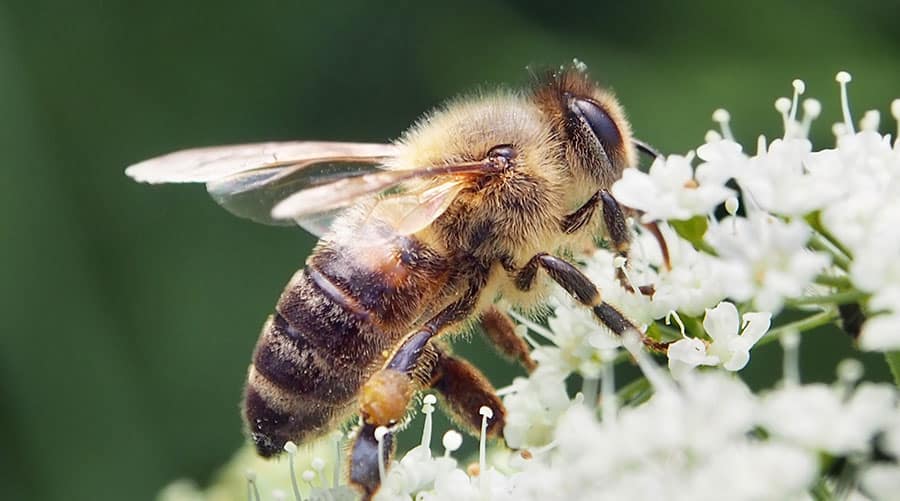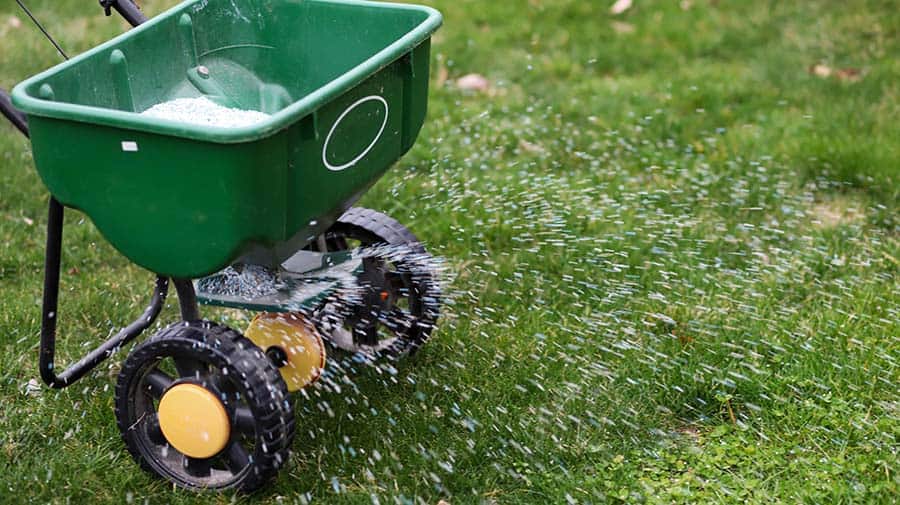Weed and Feed That Does Not Harm Bees
As an Amazon Associate we earn from qualifying purchases made on our website. If you make a purchase through links from this website, we may get a small share of the sale from Amazon and other similar affiliate programs.
These days, many concerned people are wondering if lawn fertilizer kills bees. It's a good question! Bees are under attack by reducing their natural habitat through pollution, disease, and urban expansion. We need bees, and we need to find helpful ways to support their survival.
If lawn fertilizer kills bees, that is an essential thing for gardeners and bee-lovers to know. In this article, we will get into the truth about whether or not lawn fertilizer kills bees.
Lawn Fertilizer helps lawns grow and does not typically kill bees. Most lawn fertilizers consist of chemicals that have no significant impact on humans or other living creatures like bees. It is safe to fertilize your lawn, and that will not affect bees.
Bees have environmental, nutritional, and cultural significance. These flying, buzzing insects play a valuable role as pollinators of countless types of flowers and plants. They also make honey, a substance that humanity has used for cooking for thousands of years. Honey is so popular that many companies raise captive bees to produce it! Finally, bees appear in many myths and stories throughout human history. Bees are important to the world in many ways.
Is Fertilizer Bad For Bees?

Most types of fertilizers typically support plant growth. Fertilizers are a source of nutrients for plants that help them to grow faster and more robust. There are two main kinds of fertilizers available.
Organic fertilizers are very popular and consist of plant or animal organic material, sometimes with added organically sourced minerals. The fertilizer comes in their raw, original state, or pellet form. Manure and compost are great examples of organic types of fertilizer.
One downside to using organic fertilizers is that they can take a significant amount of time to impact the plants in the area where they have been applied. However, the impacts are long-lasting once they appear. Organic fertilizers have no adverse impact on bees and actually can serve to attract more bees to the area.
There are also synthetic fertilizers available to purchase that are composed of a variety of chemicals. These commercial fertilizers produced in granular or liquid form, are readily available. Both forms are famous for speedy results that can happen after being applied. However, these results are not long-lasting, requiring multiple applications of the fertilizer to sustain the effect.
The vast majority of synthetic types of fertilizers have no impact on bee health or behavior as their focus is on promoting plant growth. These fertilizers give a quick release of nutrients to encourage the lawn to grow.
However, unlike organic fertilizers, their chemicals can destroy existing microorganisms in the soil if overused. It's best to use these synthetic fertilizers sparingly, and with lots of water, dilution to ensure minimal impact on the surrounding area, including bees.
If you like to learn how to create a bee friendly lawn, check out this video here from the University of Minnesota. It's a great resource!
Is Miracle-Gro Bad For Bees?
Miracle-Gro is a synthetic fertilizer that contains ammonium phosphate, which delivers extra amounts of nitrogen to plants. This additional nitrogen causes plants to grow faster and more extensive than average. Miracle-Gro is an all-purpose plant food designed for application to plants and grass after being mixed with water.
The Miracle-Gro products are one of, if not the best known and popular brands of gardening supplies such as fertilizer in North America.
One thing to consider is that excess use of Miracle-Gro can cause your soil to lose essential nutrients and organisms in the long term. Also, too much Miracle-Gro in your soil can result in the chemicals being washed into the local water system and added to the pollution.
Miracle-Gro doesn't have any insecticides or herbicides listed in the ingredient list. It means that the purpose of this additive is to promote the health of plants through fertilization. There is nothing contained in the ingredients intended to harm the plant, insect, or human life. Because of this, Miracle-Gro is not bad for bees.
You can get Miracle-Gro here on Amazon.
Is Scotts Turf Builder Safe For Bees?
Scotts Turf Builder is available in multiple formats. Some of these formats have a weed killer ingredient in addition to the fertilizer ingredients. The intent with these "weed and feed" varieties of Scotts Turf Builder is to fertilize the grass to encourage growth while killing the weeds that usually try to grow in the grass, like dandelions. These types of Scotts Turf Builder chemicals are not encouraged if you want to prevent bees' adverse effects. Due to herbicides' inclusion, they are considered slightly toxic to birds, bees, and pets.
It's also important to note that when pesticides mix with fertilizer, such as with this first type of Scotts Turf Builder, the pesticide can end up in the water table when it rains, which will affect all forms of life in the area, including bees. The pesticide can also track into your house or impact children playing in the yard.
However, Scotts Turf Builder also offers a type of fertilizer that doesn't contain any weed killer. This chemical should be applied to grass to help it grow stronger and faster. There are no additional ingredients with any pesticide or herbicide added. This type of Scotts Turf Builder (link to Amazon) will have no adverse impact on the area's water sources as long as used as instructed. It is safe for children and animals, along with bees that live around your yard.
Is TruGreen Safe For Bees?
TruGreen is a lawn and garden service company with offices in many cities and towns across the United States and Canada. They offer a variety of services to homeowners ranging from lawn fertilization to weed control to tree servicing. Because the services offered by TruGreen vary so widely, there is not a simple answer to whether or not their practices are safe for bees. However, we can do a more in-depth examination to explain which practices are safe for bees.
One popular TruGreen Service is their lawn fertilization. This process only involves chemical fertilizers tested to be safe for animals and insects. TruGreen applies these synthetic fertilizers to lawns in liquid or granular form. These fertilizers intend to encourage the lawn to grow healthy and green by giving it a shot of extra nutrients and minerals. So, if you only request the lawn fertilization service, your local bees should remain healthy and happy.

However, another service offered by TruGreen is weed and dandelion control for your lawn. This process uses herbicides to kill varieties of weeds that commonly occur in lawn grass. While the herbicides do not have a formulation to harm bees, they can be toxic to any life exposed to them. If you are concerned about your local bees, do not use this portion of the TruGreen Service.
Finally, TruGreen offers a tree and shrub service. This service can involve spraying pesticides on the leaves of trees and shrubs in your yard to kill insects living in them. While there is no intention for this pesticide spray to harm local bees, the formulation was created to kill insects. If bees in the area come into contact with the pesticide in the air or on the leaves, their behavior could be impacted, or even die. To ensure that your area bees stay happy and healthy, do not use the tree and shrub service offered by TruGreen.
Conclusion
Bees are an essential part of our global ecosystem, and we must examine our daily habits to make sure that we are making the most sensible choices possible to ensure they're well being.
Many species of bees are disappearing from portions of the earth due to human practices. It is counterproductive to our interests, as bees help pollinate source plants for much of our food. Bees are also the sole source of honey, a food item that humans love to use.
Because of building and land development, their natural foraging grounds are disappearing at an alarming rate. Also, the earth is continually becoming more polluted. Pollution impacts every living creature and plant, and that includes bees.
Finally, as the earth's balance becomes disrupted due to pollution, illness and disease are attacking living creatures in new ways. Bees are not immune to this trend, and some species are dying out due to new diseases.
Many keen gardeners have the desire to see a lush, green lawn. However, they also want to see bees happily buzzing around their yard, enjoying the flowers and plants. Gardeners have a special love for bees because they assist in pollinating their beloved garden. Fertilization is often a key component in every gardener's seasonal practice. Naturally, they would worry that their lawn fertilization could impact the bees that visit their yard. Bees are part of their local ecosystem. However, gardeners can rest easy, as, in the vast majority of cases, lawn fertilization does not impact bees and their behavior.
Are you a landscaping enthusiast and want to help me grow Landscapingplanet.com? I am looking for writers! Just send me an email at [email protected]
Source: https://landscapingplanet.com/does-lawn-fertilizer-kill-bees/
0 Response to "Weed and Feed That Does Not Harm Bees"
Post a Comment